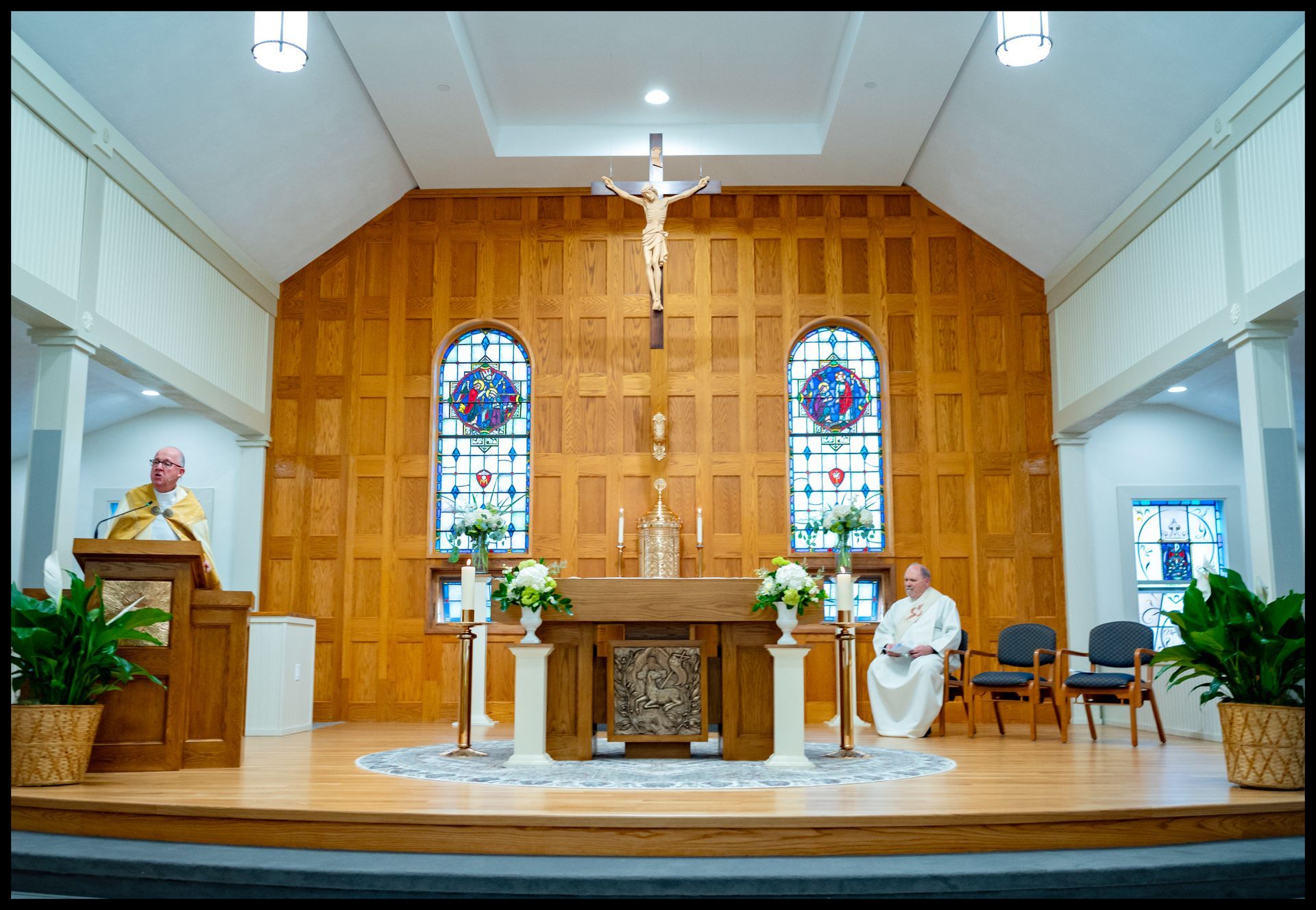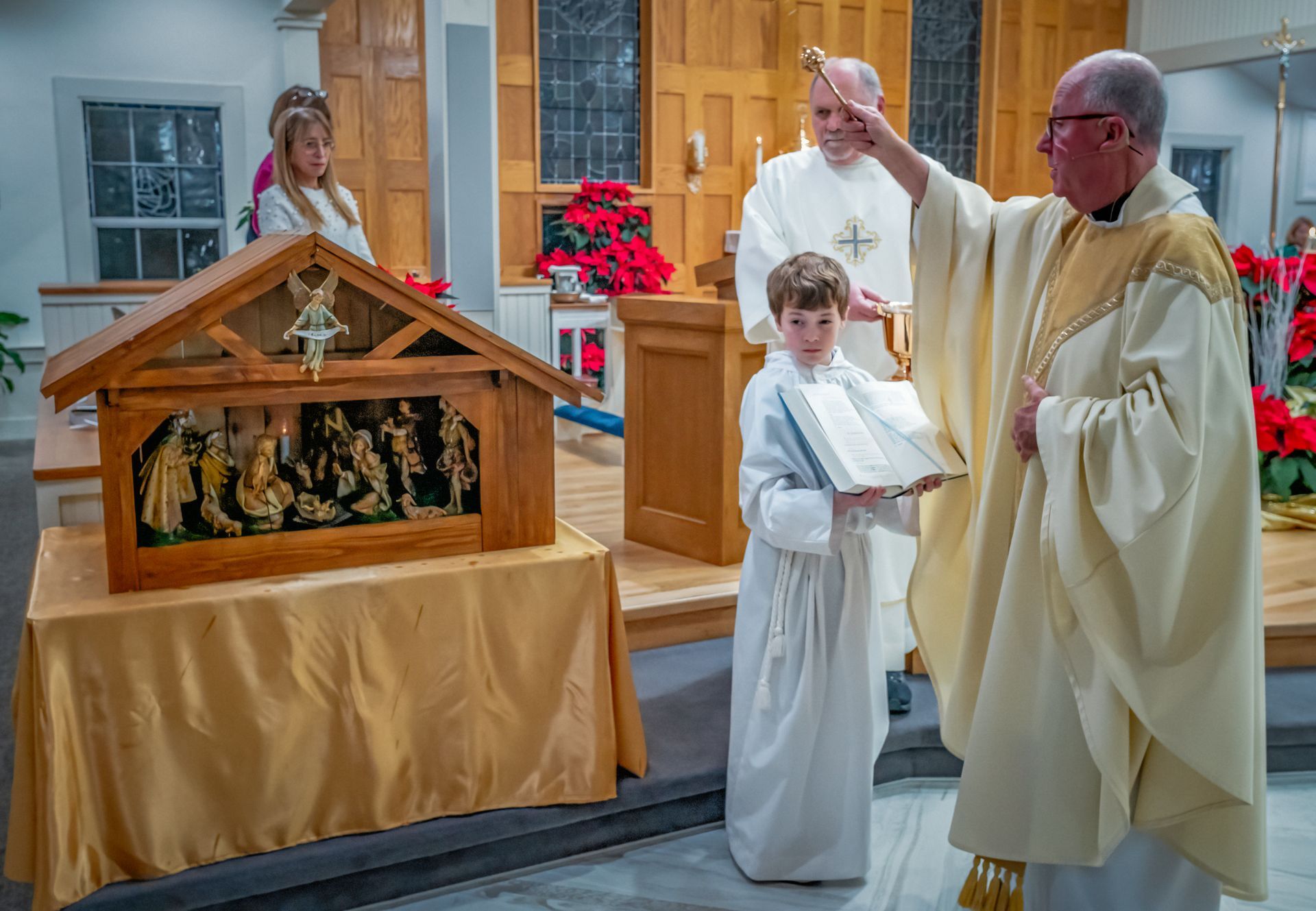27th Sunday of Ordinary Time Homily
27th Sunday of Ordinary Time- Fr. John Sullivan
Have you ever been angry at God? Now that is a ridiculous question. Of course you have! God is probably humanities biggest punching bag. God gets blamed for so much. Somewhere along the line we all have experienced situations where God didn’t live up to our expectations. We experienced suffering when things didn’t go our way. Life deals out hurt and we become angry at God. We suffer a loss and feel God is to blame. We question God’s care and protection for us and our loved ones and begin to believe God is at fault. Our enemies seem to gain the upper hand and God doesn’t smite them. It can be easy to get upset and disappointed in God.
If you have ever felt disillusioned or let down by God you are in the right place today. If you are here today wondering why bad things happen to good people or good things to bad. Why it seems you are getting punished by God or feel neglected by God, you will find what I have to say relevant to your situation. So, pay attention.
You are feeling very much like Habakkuk the prophet who wrote today’s first reading. Habakkuk is one of what we call the minor prophets. He isn’t called that because he was unimportant or second rate. He is a minor prophet because the Book of the Prophet Habakkuk is very short. It is only three chapters long. You can read it in fifteen to twenty minutes.
Habakkuk lived about six hundred years before Christ. Some Bible scholars propose he was the scribe to the Prophet Jeremiah, so he could have contributed a great deal more to scripture than just what we call the Book of Habakkuk. Jeremiah and Habakkuk lived in very tumultuous times. Judea and Jerusalem were under threat of attack from the Babylonians. Threats weren’t only coming from outside the nation. The political climate inside the country was also in turmoil. There was corruption, political rivalries, social turmoil, and abuse of the vulnerable. Does that sound familiar? It felt as if God had abandoned God’s people.
Habakkuk is feeling particularly frustrated with what is going on around him. He is heartbroken because he has been trying to do his best to correct the situation. He has been preaching repentance for sin, an end to abuses, and for the people to return to faith in God as a solution to the problems of the times. No one is listening. Rather than being attentive to the reforms preached by the prophets the powerful are persecuting them. The voices of reason are being suppressed by the powerful and special interests. God seems to be ineffective at correcting what is happening all around Habakkuk.
Habakkuk turns to God in prayer and he lets it rip. He doesn’t politely hold back how he feels. We do some of our best praying when we are frustrated or angry with God. We let our emotions fly and are brutally honest with God. When we feel God isn’t performing up to our expectations we don’t tend to hold back our true emotions. God doesn’t mind. God has big shoulders and can take our anger. God actually appreciates our honest prayer. Brutally honest, emotional prayer is what God wants to hear from us. It actually expresses an earnest belief in the power of God.
Do you remember what Habakkuk prayed? He said:
How long, O LORD, must I cry for help
and you do not listen?
Or cry out to you, “Violence!”
and you do not intervene?
Why do you let me see iniquity?
why do you simply gaze at evil?
Destruction and violence are before me;
there is strife and discord.
Pretty honest and demanding, isn’t it?
He is upset and ready to lower his expectations of God. When we are frustrated with our life situation we are tempted to lower our expectations. We begin to ask questions like, “What difference does it make if I try to live a good life? What is the purpose of going to church? Why bother taking the time to pray?” We begin to feel like giving up on God. We start giving in to our frustrations and disappointment. We can tend to start becoming cynical and depressed.
A basic human need is the belief in a better future. We expect the future to be brighter and more fulfilling. That is God’s plan also. Salvation history reveals it. Abraham was called to leave his familiar surrounds and follow God’s promptings to go into the wilderness seeking a better life. God rescued the Israelites from slavery in Egypt so God could lead them to a land of milk and honey. According to the Gospel of John, the purpose for God sending Jesus was, “I come that you might have life and have it more abundantly.” When things aren’t going according to our plan we need to stop and recognize that God has an even better plan for us. It is an amazing promise God has made to all of us.
When we find ourselves slipping into despair and lowering our expectations of God, we need to do what Habakkuk did. Pour out our frustrations with God. Don’t hold back. Be honest and straightforward about our disappointments. Name them. You might find writing them down on paper helpful? When our frustrations become concrete and real, they can become easier to manage. When they are in front of us our concerns are easier to sort out. They don’t feel so formidable and overwhelming.
Now, expect God to answer you. Position yourself to be able to hear how God wants to guide you to listen to God respond with a plan. Habakkuk did that. He said in today’s reading:
I will stand at my guard post,
and station myself upon the rampart;
I will keep watch to see what he will say to me,
and what answer he will give to my complaint.
Habakkuk set himself up in a place where he could quiet himself, away from distractions. To listen to God, find your quiet safe place where you can open your soul to listen to God. When we enter that place, we are open to the spiritual growth God wants to share with us. Habakkuk goes to the rampart of the city wall. It is the place where he can look out over the city and the nation and open himself to God’s big picture.
For us prayer is our rampart. It can be here in church or a favorite out of the way spot. If you belong to one of our Small Faith Sharing Groups, it might be your listening post. With their help and shared experience, a Small Group can help us hear God’s guidance and direction. We need to expect God’s response. If we open ourselves God will give us insight and a focus to act on God’s direction. It might not come immediately, at the snap of our fingers, but if we remain in a position to listen God always responds to our prayer. God will work for good.
Remember how God responded to Habakkuk.
Then the LORD answered me and said:
Write down the vision;
Make it plain upon tablets,
so that the one who can reads it readily.
For the vision is a witness for the appointed time,
a testimony to the end; it will not disappoint.
If it delays, wait for it,
it will surely come; it will not be late.
See, the rash have no integrity;
but the just one who is righteous because of faith shall live.
God will send us a vision. Most likely not a physical one but a response plan for a preferred future. It will be a plan for what could or should be. It isn’t something that exists now but God’s response for our future. It is God’s response to the challenges of today. God tells Habakkuk that he sees the problems faced by Habakkuk and the people. God will rectify the situation but it will be in God’s time.
As Christians we believe that God addressed Habakkuk’s concerns through the life and ministry of Jesus Christ. Jesus was God’s answer to changing the world into the Kingdom of Heaven. If we model our lives on Jesus’ example, if we strive to live with the same degree of love as Jesus Christ, we can change the world.
This week, even if you aren’t feeling like a complete malcontent, use some of your prayer time to express whatever discontent you have with God. Share your frustrations, fears, worries, and woes with God. Be painfully honest with your emotions and your frustrations with God. Let God show you God’s preferred future vision for your life and the world. Allow God to unfurl the Kingdom of Heaven to you. God has tremendous power to transform evil to good. We only have to look at the cross to see how God transformed an instrument of awful pain and suffering into the tool for our salvation.
In today’s gospel we find the apostles expressing a false humility concerning their degree of faithfulness. They don’t have much in the way of expectation for their faith. Jesus tells them not to underestimate their faith. Just a little is enough to do great things, Jesus says. He tells His close associates it isn’t the size of our faith that is vital, it is how they apply their faith.
Working with God each of us has the ability to transform our world. Raise your expectations for your ability to be faithful to God. Commit to following God’s vision of discipleship for you. Expect the Kingdom of God to reign over all the earth.






